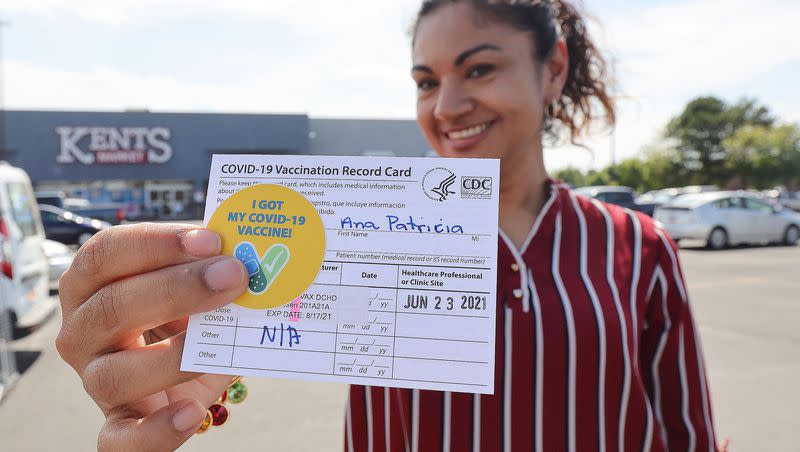Those COVID-19 vaccination cards from the federal government? They’re history. Here’s how Utahns can track their shots

Say goodbye to the federal government’s wallet-sized white cards used to track COVID-19 vaccinations throughout the pandemic.
The “COVID-19 Vaccination Record Card” that health care providers filled out every time they administered a coronavirus shot are no longer being distributed by the Centers for Disease Control and Prevention.
It’s the latest change to how the virus is being treated as a result of the national pandemic emergency ending last spring and follows the rocky rollout of the updated and newly commercialized COVID-19 vaccine.
Related
More than 980 million cards were shipped by the federal government between late 2020, when the first coronavirus vaccines came out, and May 10, The Associated Press reported, citing the latest available data.
On Wednesday, the CDC’s updated frequently asked questions page about COVID-19 vaccination spelled out that the cards are history and noted the federal agency “does not maintain vaccination records.”
States do track vaccinations, including for COVID-19, so the CDC advises Americans to contact their state health department, which can’t issue a vaccination card but can provide a digital or paper copy of their full vaccination record, not just for COVID-19.
The Utah Department of Health and Human Services isn’t anticipating a flood of requests now that the COVID-19 vaccination cards are going away, the state’s immunizations director, Rich Lakin, said.
That’s likely because there’s little call anymore for proof of COVID-19 vaccination, with a number of states, including Utah, prohibiting the shots from being required, the AARP reported.
“A card is a poor way to keep an immunization record anyway,” Lakin, said. “Because, one, you’ve got to keep it with you, and two, you’re most likely to lose it. So the best way to do it is to have some type of electronic record of it.”
How to get your COVID-19 vaccination records
Utah contracted with the Docket mobile phone app during the pandemic to provide access to individual vaccination records, Lakin said, calling it a secure way to access “immunization records in the palm on your hand.”
Related
A few states also use the Docket app and some have developed their own “vaccine passports,” while others offer no digital immunization records for COVID-19 or other vaccinations, according to a report updated earlier this year in PC Magazine.
Here’s how to obtain immunizations records in Utah:
Request a record from your health care provider.
Utah law does not require providers to submit vaccination information to the state’s “confidential, web-based information system,” known as the Utah Statewide Immunization Information Service, or USIIS, so that may be the only way to get those records.
Use the Docket app.
Utah was the first to pay to partner with app that’s linked to USIIS, Lakin said, because “our job as government is to try to fill some gaps where we feel we can provide Utahns better information regarding their immunizations. The Docket app is probably one of the best options.”
Request a record from your local health department.
All of Utah’s local health departments are linked to USIIS and can print a copy of an individual’s immunizations record.
Request a record online from the state health and human services department.
Immunization records for you or your children can be requested by filling out a form and attaching a photo ID. Those who need help or have additional questions can contact the state health and human services department by email, at usiissupport@utah.gov.
Is there a better way to track vaccinations?
The federal government’s vaccination card highlighted the need for a better, more centralized system of tracking immunizations, said Han Kim, a professor of public health at Westminster University in Salt Lake City.
“It was just a reflection of how ill-prepared we were, how fragmented we are,” Kim said. “The card served a purpose. You had to show proof of vaccination to get into businesses, to get into events. We didn’t have any sort of infrastructure to do that other than these cards.”
Of course, there were problems with the paper cards.
“Were they perfect? No, not at all. Absolutely, you can basically make copies of this, you can forge them,” the professor said. His preference is a nationwide electronic system similar to Docket, but perhaps government-run because of the personal information involved.
Coming up with a single system that everyone in the U.S. uses would benefit not just public health monitoring, but also make it easier for people keep track of their shots across state lines, he said.
But will Americans ever again need a quick way to show they’ve been vaccinated against COVID-19, now that indicators have been climbing across the country and in Utah since mid-summer?
“Hard to say,” Kim said, describing the virus as appearing to have become milder. “At the same time, this has been a highly unpredictable disease. It is much more mutable than we thought. ... It’s always a good idea to have a record.”

